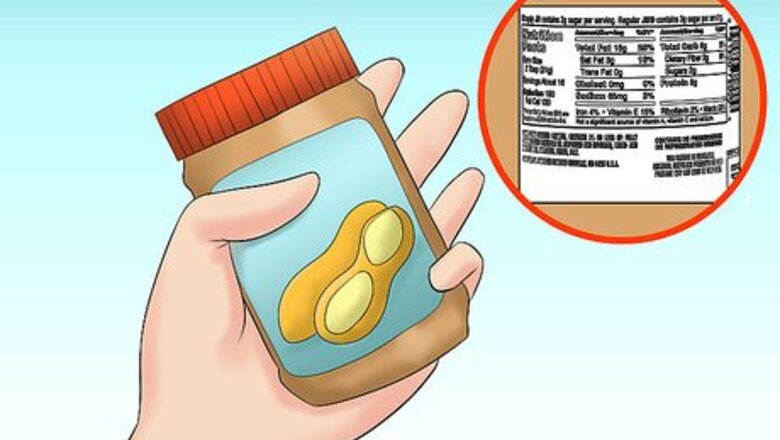
views
X
Trustworthy Source
Harvard Medical School
Harvard Medical School's Educational Site for the Public
Go to source
If you take your time to read the label and ingredients and compare different brands, you can find a peanut butter that's both delicious and healthy to eat.
Evaluating the Ingredients
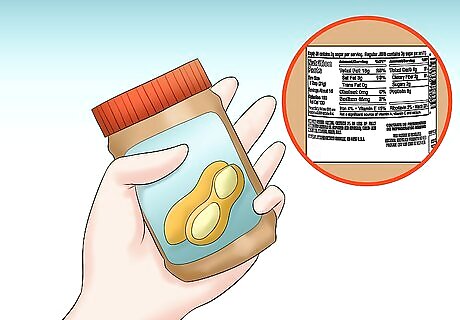
Read the ingredients list. Many popular brands include unhealthy ingredients and chemicals such as corn syrup, hydrogenated vegetable oil, mono- and di-glycerides, soy protein concentrate, maltodextrin, and soy lecithin. Pure peanut butter is made of roasted peanuts and doesn't require additional ingredients. Look for brands that exclusively use roasted peanuts in the ingredients list. Ingredients are listed in order of weight, so the number one ingredient should be peanuts. Brands like Skippy, Planters, and Great Value contain additional sugar and additives. Maltodextrin is a caloric sweetener made from rice, potatoes, or cornstarch and can raise blood glucose and insulin levels. Monoglycerides and diglycerides are food additives used to prevent the oil from separating out of peanut butter. This means it is natural and normal to see the oil on top of peanut butter that does not have this additive.
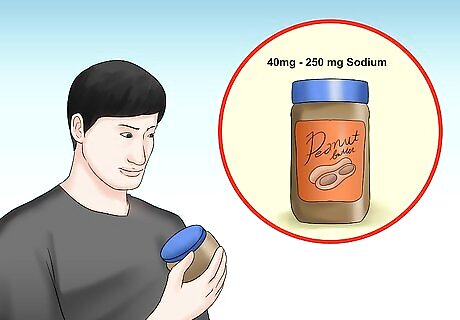
Look for a peanut butter that is low in sodium. While an all-natural peanut butter can be healthier than one that has chemical additives, different peanut butter brands have a different sodium content. Sodium is an ingredient that's found in healthy peanut butter but should be taken into consideration, especially for those with conditions like diabetes or high blood pressure. Peanut butter typically ranges from 40 mg to 250 mg of sodium per serving of 2 tablespoons.
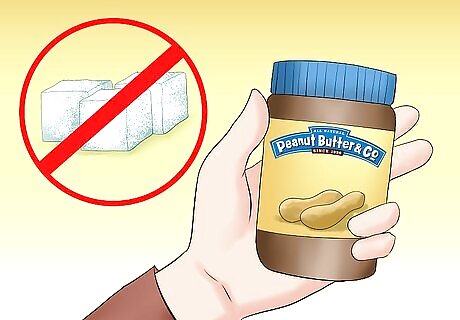
Find a peanut butter that's low in sugar. No sugar is required to make peanut butter, but brands typically add it to enhance its flavor. Look for natural ingredients and sweeteners like honey, cane syrup, or agave nectar. Avoid artificial sweeteners like aspartame. If you can't find a peanut butter that uses natural sugars, then find one that's low in sugar. Peanut butter typically contains one to four grams of sugar per serving. Special peanut butter like Peanut Butter & Co. Cinnamon Raisin Swirl and Sunland Natural Peanut Butter Creamy Chocolate Spread can contain up to 9 grams of sugar.
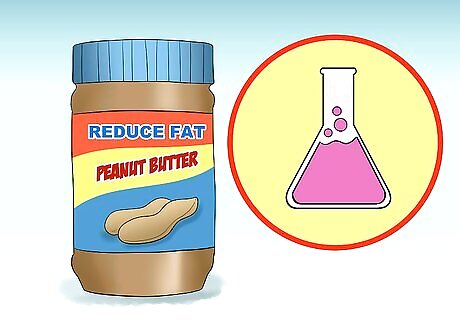
Avoid low-fat or reduced fat options. While the idea of reduced saturated fat sounds like a healthy option, it's typically coupled with a ton of unnatural chemicals and additives. Pay attention to brands that tout to be low or reduced fat variations.
Comparing Brands
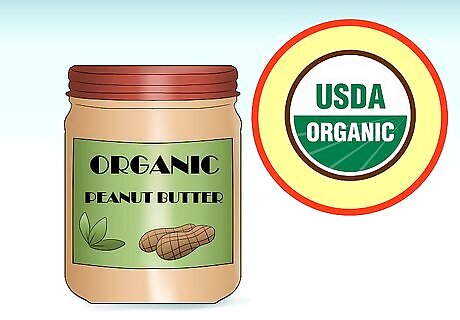
Look for organic brands. Organic peanut butter brands are typically healthier and don't contain GMOs (although science has shown there is nothing wrong with GMOs) or other added chemicals. Peanuts that grow organically are free of pesticides. Look for brands that say organic on the front or have organic in the name of the peanut butter. GMO stands for genetically modified organism and there are said to be trace amounts in peanut butter. Popular organic brands include Peanut Butter & Company: Smooth Operator, Everyday Value, 365 Organic Unsweetened, and Trader Joe's Organic.
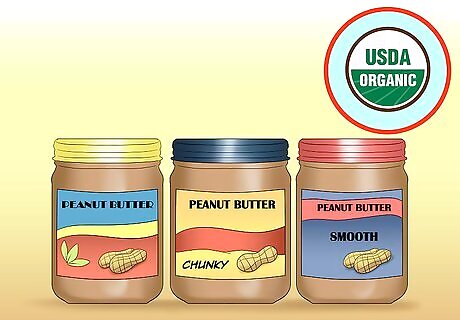
Taste test various healthy brands. To find a healthy brand of peanut butter that you can actually enjoy, you should taste test all the major brands that you've evaluated to be healthy. Once you determine a brand that you enjoy, you'll have an idea of what kind of healthy peanut butter you like best. Determine whether you like chunky or smooth peanut butter and seek healthy variations that suit your tastes. Natural peanut butter will have some separation. Store it upside down and stir well before using, and you should be good to go!
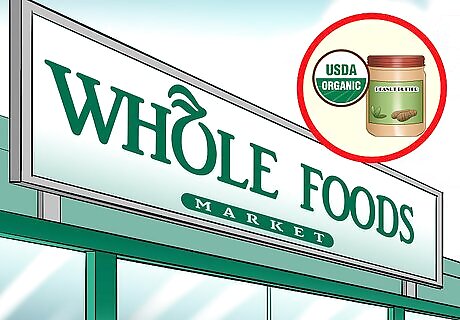
Find grocery store chains that carry a variety of peanut butter. Stores like Wholefoods or Trader Joe's may have a greater variety of healthy or organic peanut butter. Other large chains may also have variations, but will also often carry the unhealthy versions that are packed with chemical additives. Health food grocery chains have their own brands which are often all natural.
Purchasing Healthy Alternatives
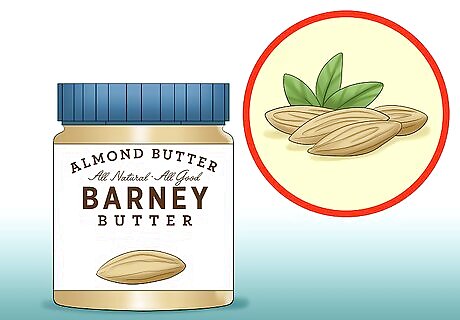
Try out almond butter. Almonds are the most nutritionally dense nut and contain potassium, calcium, vitamin E, magnesium, phosphorous, and iron. While some nut butters do contain a significant amount of fat per serving, they are typically the more healthful fats that lower LDL cholesterol and reduce the risk of heart disease. They can lead to decreased obesity because they keep you feeling full longer. Almond butter is said to be drier than peanut butter, so choose different brands until you find one you can enjoy. Popular almond butter brands include Kevala and Barney Butter.
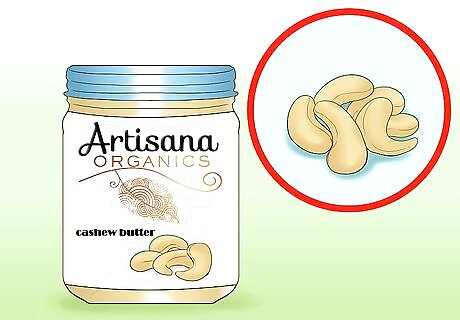
Purchase cashew butter. While cashew butter does not contain the high levels of protein found in peanut butter, it does contain essential vitamins and nutrients such as iron, magnesium, zinc, copper, phosphorous, and manganese. Also, cashew butter may also reduce triglyceride levels which will improve can improve health, especially for people with diabetes. Artisana Raw Organic is a healthy, organic, cashew butter.
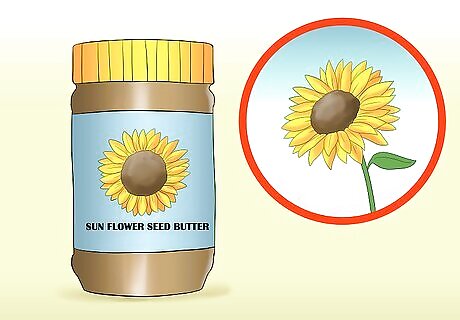
Try sunflower seed butter. Sunflower seed butter unsurprisingly tastes like sunflower seeds, but can also be healthy for you. Sunflower seed butter is packed with magnesium and antioxidants like vitamin E.
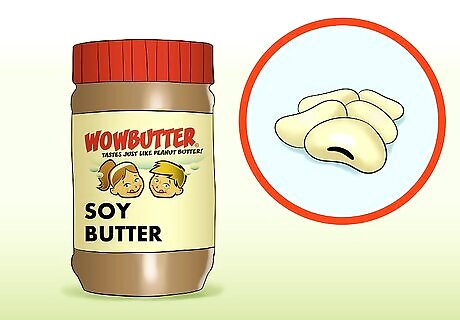
Purchase soy nut butter. Soy nut butter is made from roasted soybeans and mixed with soybean oil. Soy nut butters are often creamy in texture and savory with a nutty texture. Soy nuts typically contain more protein than peanut butter and can prevent heart disease and cancer. Healthy soy nut butter brands include WOWBUTTER and I.M.Healthy.
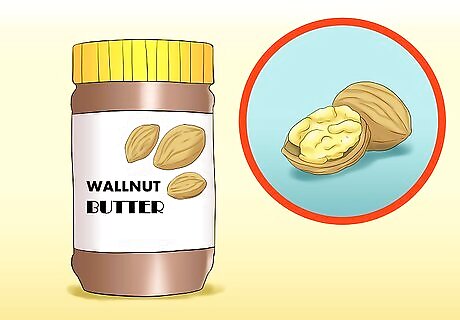
Try walnut butter. Walnut butter is packed with critical Omega-3 fats which can reduce your body's inflammation. Walnut butter is also a healthy alternative for recipes that call for peanut butter, such as cookies. Walnut butters are prone to going bad so be sure to store it in the refrigerator.



















Comments
0 comment